Effective Business Communication: Tourism and Hospitality in Australia
VerifiedAdded on 2022/08/21
|10
|1906
|10
Report
AI Summary
This report provides an analysis of effective business communication tools for organizations in the Australian tourism and hospitality industry, specifically focusing on social media platforms. It explores the importance of communication in achieving organizational goals, fostering customer engagement, and enhancing brand image. The report includes a literature review examining the role of social media users, changing consumer behavior, and the strategies employed by small tourism enterprises. It highlights the benefits of social media for marketing, customer feedback, and information sharing. Furthermore, the report offers recommendations for improving communication strategies, such as utilizing visual aids, creating feedback forums, enhancing public relations, and using blogs to showcase services. The conclusion emphasizes the effectiveness of social websites as a communication tool, their impact on consumption trends, and their potential to establish strong relationships between organizations and their target customers. References are provided to support the research and findings presented in the report.
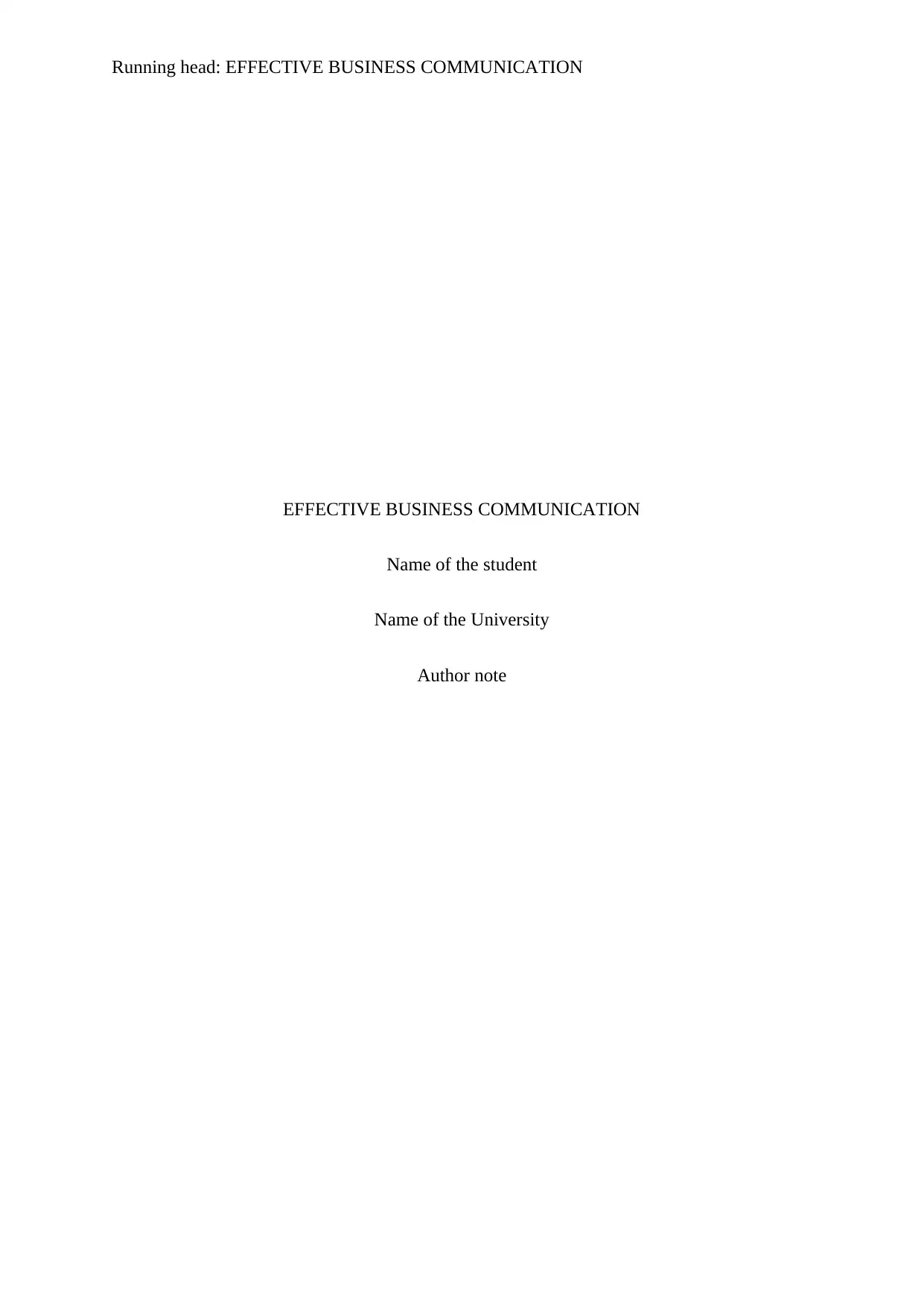
Running head: EFFECTIVE BUSINESS COMMUNICATION
EFFECTIVE BUSINESS COMMUNICATION
Name of the student
Name of the University
Author note
EFFECTIVE BUSINESS COMMUNICATION
Name of the student
Name of the University
Author note
Paraphrase This Document
Need a fresh take? Get an instant paraphrase of this document with our AI Paraphraser
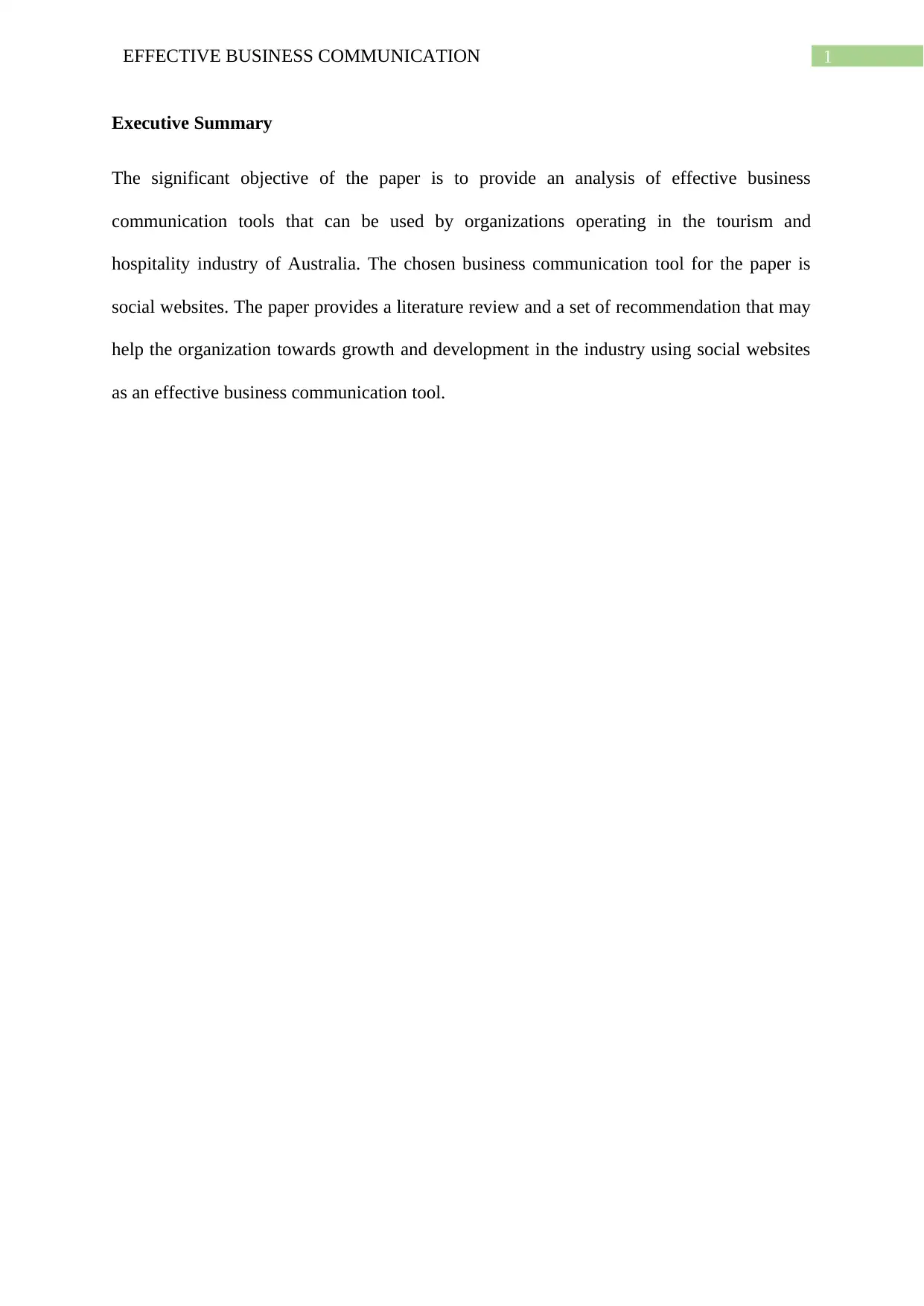
1EFFECTIVE BUSINESS COMMUNICATION
Executive Summary
The significant objective of the paper is to provide an analysis of effective business
communication tools that can be used by organizations operating in the tourism and
hospitality industry of Australia. The chosen business communication tool for the paper is
social websites. The paper provides a literature review and a set of recommendation that may
help the organization towards growth and development in the industry using social websites
as an effective business communication tool.
Executive Summary
The significant objective of the paper is to provide an analysis of effective business
communication tools that can be used by organizations operating in the tourism and
hospitality industry of Australia. The chosen business communication tool for the paper is
social websites. The paper provides a literature review and a set of recommendation that may
help the organization towards growth and development in the industry using social websites
as an effective business communication tool.
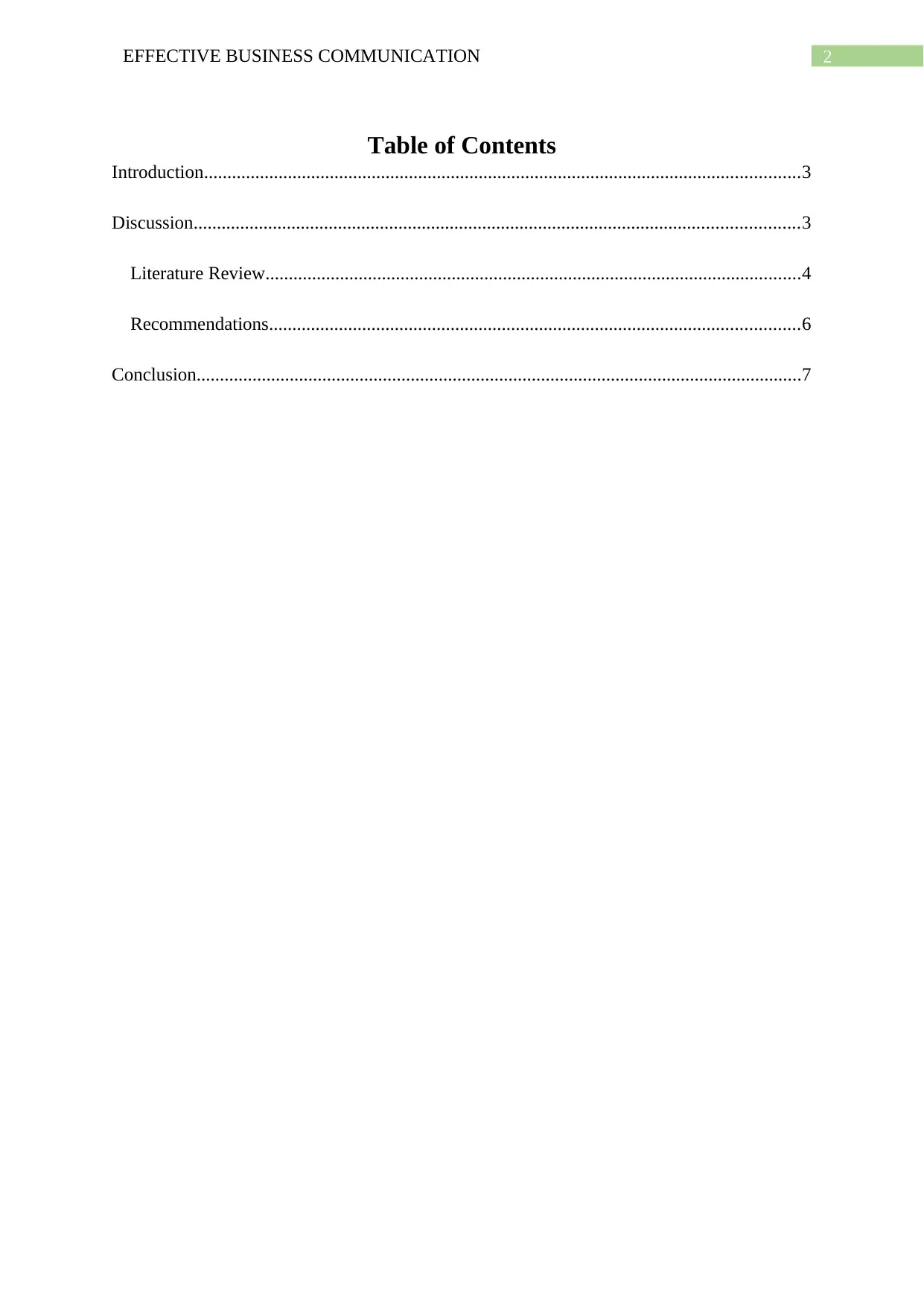
2EFFECTIVE BUSINESS COMMUNICATION
Table of Contents
Introduction................................................................................................................................3
Discussion..................................................................................................................................3
Literature Review...................................................................................................................4
Recommendations..................................................................................................................6
Conclusion..................................................................................................................................7
Table of Contents
Introduction................................................................................................................................3
Discussion..................................................................................................................................3
Literature Review...................................................................................................................4
Recommendations..................................................................................................................6
Conclusion..................................................................................................................................7
⊘ This is a preview!⊘
Do you want full access?
Subscribe today to unlock all pages.

Trusted by 1+ million students worldwide
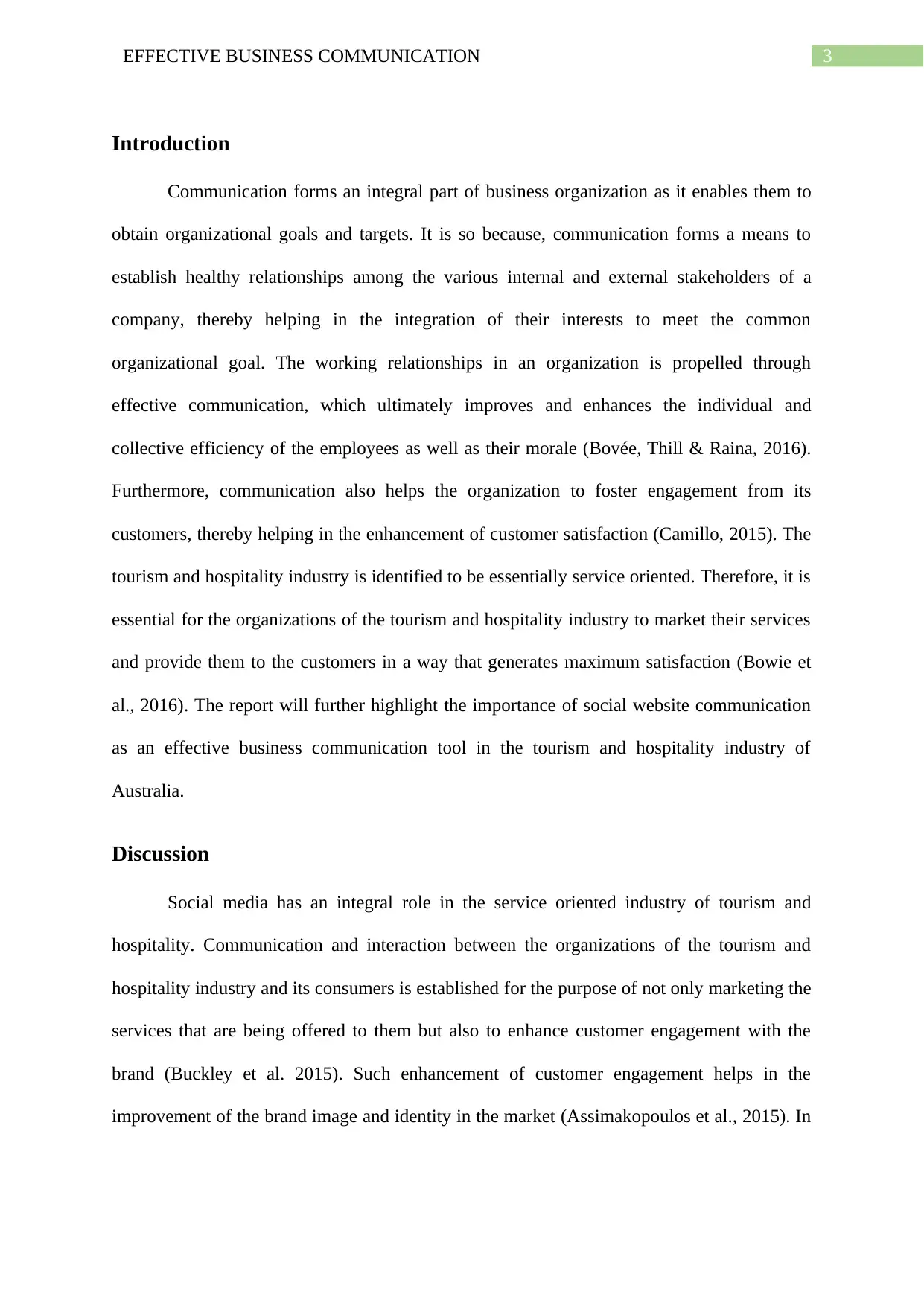
3EFFECTIVE BUSINESS COMMUNICATION
Introduction
Communication forms an integral part of business organization as it enables them to
obtain organizational goals and targets. It is so because, communication forms a means to
establish healthy relationships among the various internal and external stakeholders of a
company, thereby helping in the integration of their interests to meet the common
organizational goal. The working relationships in an organization is propelled through
effective communication, which ultimately improves and enhances the individual and
collective efficiency of the employees as well as their morale (Bovée, Thill & Raina, 2016).
Furthermore, communication also helps the organization to foster engagement from its
customers, thereby helping in the enhancement of customer satisfaction (Camillo, 2015). The
tourism and hospitality industry is identified to be essentially service oriented. Therefore, it is
essential for the organizations of the tourism and hospitality industry to market their services
and provide them to the customers in a way that generates maximum satisfaction (Bowie et
al., 2016). The report will further highlight the importance of social website communication
as an effective business communication tool in the tourism and hospitality industry of
Australia.
Discussion
Social media has an integral role in the service oriented industry of tourism and
hospitality. Communication and interaction between the organizations of the tourism and
hospitality industry and its consumers is established for the purpose of not only marketing the
services that are being offered to them but also to enhance customer engagement with the
brand (Buckley et al. 2015). Such enhancement of customer engagement helps in the
improvement of the brand image and identity in the market (Assimakopoulos et al., 2015). In
Introduction
Communication forms an integral part of business organization as it enables them to
obtain organizational goals and targets. It is so because, communication forms a means to
establish healthy relationships among the various internal and external stakeholders of a
company, thereby helping in the integration of their interests to meet the common
organizational goal. The working relationships in an organization is propelled through
effective communication, which ultimately improves and enhances the individual and
collective efficiency of the employees as well as their morale (Bovée, Thill & Raina, 2016).
Furthermore, communication also helps the organization to foster engagement from its
customers, thereby helping in the enhancement of customer satisfaction (Camillo, 2015). The
tourism and hospitality industry is identified to be essentially service oriented. Therefore, it is
essential for the organizations of the tourism and hospitality industry to market their services
and provide them to the customers in a way that generates maximum satisfaction (Bowie et
al., 2016). The report will further highlight the importance of social website communication
as an effective business communication tool in the tourism and hospitality industry of
Australia.
Discussion
Social media has an integral role in the service oriented industry of tourism and
hospitality. Communication and interaction between the organizations of the tourism and
hospitality industry and its consumers is established for the purpose of not only marketing the
services that are being offered to them but also to enhance customer engagement with the
brand (Buckley et al. 2015). Such enhancement of customer engagement helps in the
improvement of the brand image and identity in the market (Assimakopoulos et al., 2015). In
Paraphrase This Document
Need a fresh take? Get an instant paraphrase of this document with our AI Paraphraser
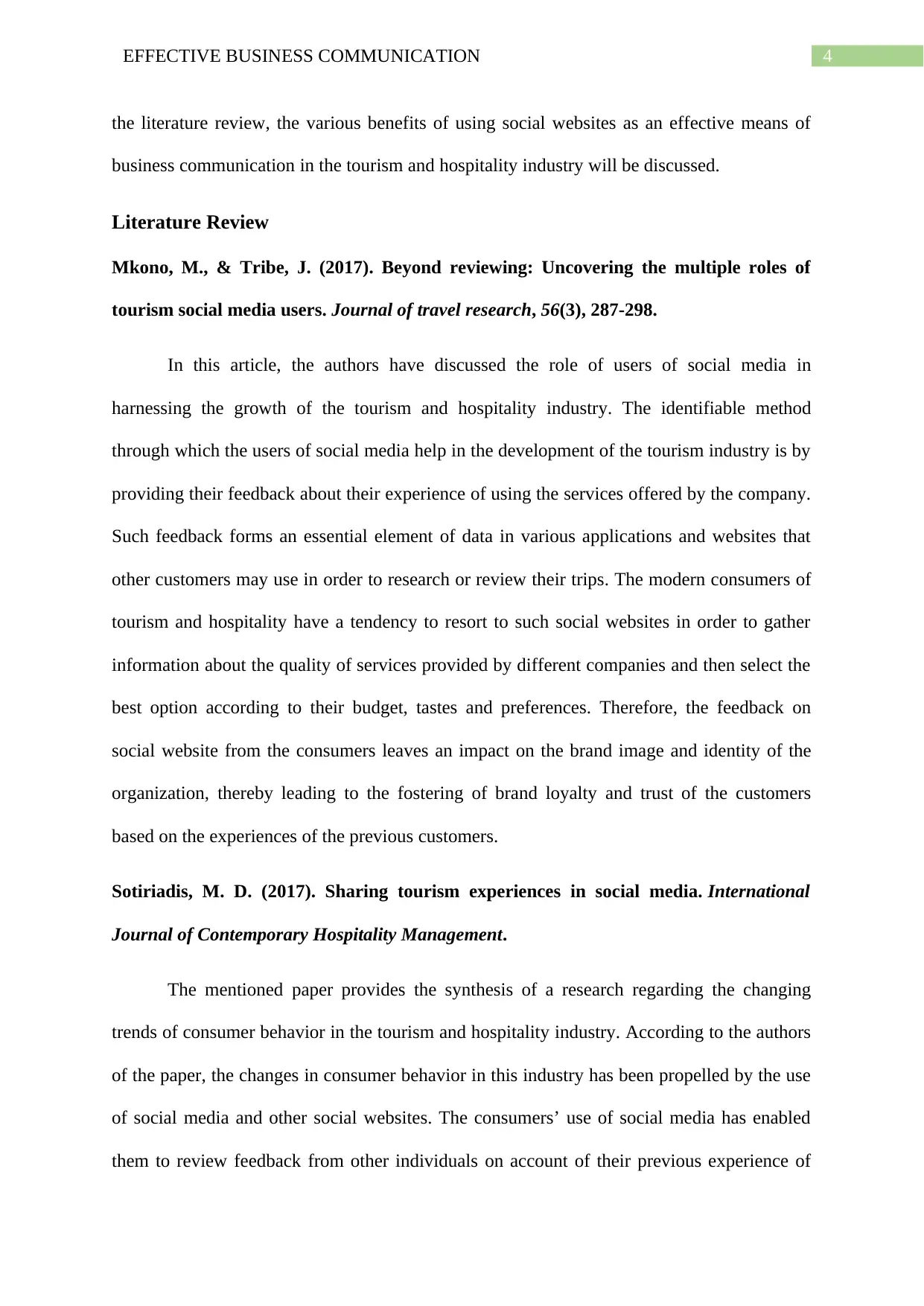
4EFFECTIVE BUSINESS COMMUNICATION
the literature review, the various benefits of using social websites as an effective means of
business communication in the tourism and hospitality industry will be discussed.
Literature Review
Mkono, M., & Tribe, J. (2017). Beyond reviewing: Uncovering the multiple roles of
tourism social media users. Journal of travel research, 56(3), 287-298.
In this article, the authors have discussed the role of users of social media in
harnessing the growth of the tourism and hospitality industry. The identifiable method
through which the users of social media help in the development of the tourism industry is by
providing their feedback about their experience of using the services offered by the company.
Such feedback forms an essential element of data in various applications and websites that
other customers may use in order to research or review their trips. The modern consumers of
tourism and hospitality have a tendency to resort to such social websites in order to gather
information about the quality of services provided by different companies and then select the
best option according to their budget, tastes and preferences. Therefore, the feedback on
social website from the consumers leaves an impact on the brand image and identity of the
organization, thereby leading to the fostering of brand loyalty and trust of the customers
based on the experiences of the previous customers.
Sotiriadis, M. D. (2017). Sharing tourism experiences in social media. International
Journal of Contemporary Hospitality Management.
The mentioned paper provides the synthesis of a research regarding the changing
trends of consumer behavior in the tourism and hospitality industry. According to the authors
of the paper, the changes in consumer behavior in this industry has been propelled by the use
of social media and other social websites. The consumers’ use of social media has enabled
them to review feedback from other individuals on account of their previous experience of
the literature review, the various benefits of using social websites as an effective means of
business communication in the tourism and hospitality industry will be discussed.
Literature Review
Mkono, M., & Tribe, J. (2017). Beyond reviewing: Uncovering the multiple roles of
tourism social media users. Journal of travel research, 56(3), 287-298.
In this article, the authors have discussed the role of users of social media in
harnessing the growth of the tourism and hospitality industry. The identifiable method
through which the users of social media help in the development of the tourism industry is by
providing their feedback about their experience of using the services offered by the company.
Such feedback forms an essential element of data in various applications and websites that
other customers may use in order to research or review their trips. The modern consumers of
tourism and hospitality have a tendency to resort to such social websites in order to gather
information about the quality of services provided by different companies and then select the
best option according to their budget, tastes and preferences. Therefore, the feedback on
social website from the consumers leaves an impact on the brand image and identity of the
organization, thereby leading to the fostering of brand loyalty and trust of the customers
based on the experiences of the previous customers.
Sotiriadis, M. D. (2017). Sharing tourism experiences in social media. International
Journal of Contemporary Hospitality Management.
The mentioned paper provides the synthesis of a research regarding the changing
trends of consumer behavior in the tourism and hospitality industry. According to the authors
of the paper, the changes in consumer behavior in this industry has been propelled by the use
of social media and other social websites. The consumers’ use of social media has enabled
them to review feedback from other individuals on account of their previous experience of
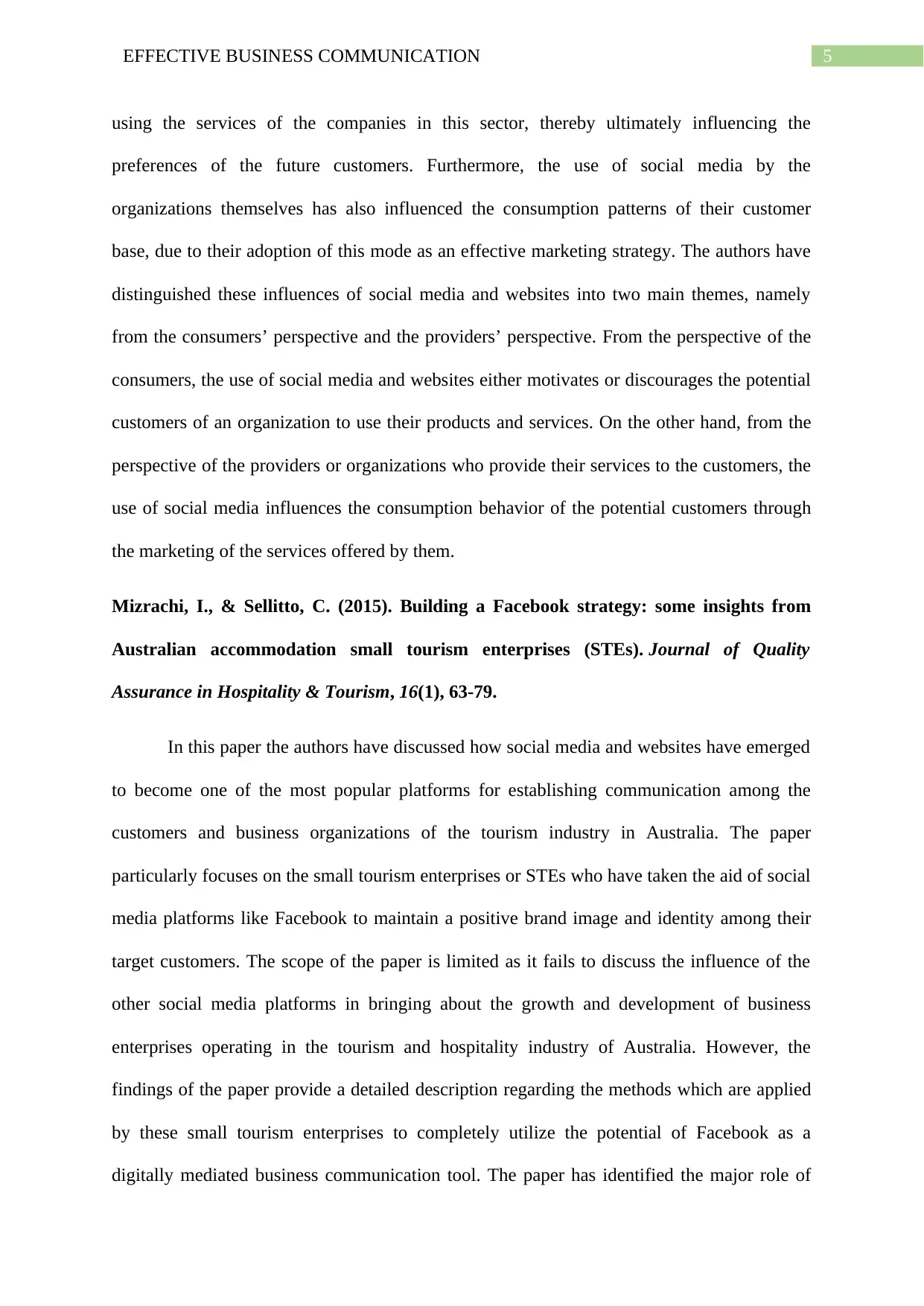
5EFFECTIVE BUSINESS COMMUNICATION
using the services of the companies in this sector, thereby ultimately influencing the
preferences of the future customers. Furthermore, the use of social media by the
organizations themselves has also influenced the consumption patterns of their customer
base, due to their adoption of this mode as an effective marketing strategy. The authors have
distinguished these influences of social media and websites into two main themes, namely
from the consumers’ perspective and the providers’ perspective. From the perspective of the
consumers, the use of social media and websites either motivates or discourages the potential
customers of an organization to use their products and services. On the other hand, from the
perspective of the providers or organizations who provide their services to the customers, the
use of social media influences the consumption behavior of the potential customers through
the marketing of the services offered by them.
Mizrachi, I., & Sellitto, C. (2015). Building a Facebook strategy: some insights from
Australian accommodation small tourism enterprises (STEs). Journal of Quality
Assurance in Hospitality & Tourism, 16(1), 63-79.
In this paper the authors have discussed how social media and websites have emerged
to become one of the most popular platforms for establishing communication among the
customers and business organizations of the tourism industry in Australia. The paper
particularly focuses on the small tourism enterprises or STEs who have taken the aid of social
media platforms like Facebook to maintain a positive brand image and identity among their
target customers. The scope of the paper is limited as it fails to discuss the influence of the
other social media platforms in bringing about the growth and development of business
enterprises operating in the tourism and hospitality industry of Australia. However, the
findings of the paper provide a detailed description regarding the methods which are applied
by these small tourism enterprises to completely utilize the potential of Facebook as a
digitally mediated business communication tool. The paper has identified the major role of
using the services of the companies in this sector, thereby ultimately influencing the
preferences of the future customers. Furthermore, the use of social media by the
organizations themselves has also influenced the consumption patterns of their customer
base, due to their adoption of this mode as an effective marketing strategy. The authors have
distinguished these influences of social media and websites into two main themes, namely
from the consumers’ perspective and the providers’ perspective. From the perspective of the
consumers, the use of social media and websites either motivates or discourages the potential
customers of an organization to use their products and services. On the other hand, from the
perspective of the providers or organizations who provide their services to the customers, the
use of social media influences the consumption behavior of the potential customers through
the marketing of the services offered by them.
Mizrachi, I., & Sellitto, C. (2015). Building a Facebook strategy: some insights from
Australian accommodation small tourism enterprises (STEs). Journal of Quality
Assurance in Hospitality & Tourism, 16(1), 63-79.
In this paper the authors have discussed how social media and websites have emerged
to become one of the most popular platforms for establishing communication among the
customers and business organizations of the tourism industry in Australia. The paper
particularly focuses on the small tourism enterprises or STEs who have taken the aid of social
media platforms like Facebook to maintain a positive brand image and identity among their
target customers. The scope of the paper is limited as it fails to discuss the influence of the
other social media platforms in bringing about the growth and development of business
enterprises operating in the tourism and hospitality industry of Australia. However, the
findings of the paper provide a detailed description regarding the methods which are applied
by these small tourism enterprises to completely utilize the potential of Facebook as a
digitally mediated business communication tool. The paper has identified the major role of
⊘ This is a preview!⊘
Do you want full access?
Subscribe today to unlock all pages.

Trusted by 1+ million students worldwide
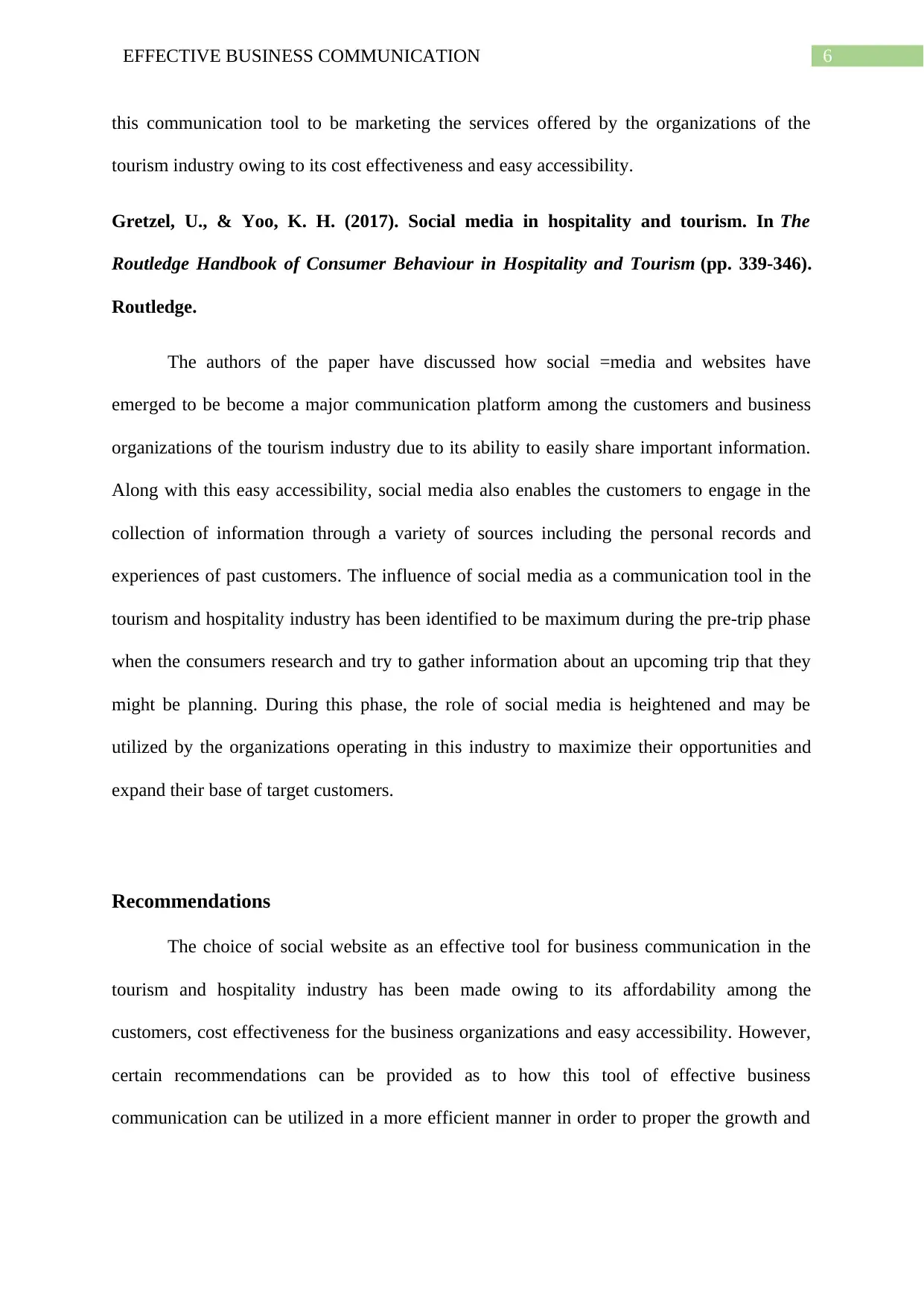
6EFFECTIVE BUSINESS COMMUNICATION
this communication tool to be marketing the services offered by the organizations of the
tourism industry owing to its cost effectiveness and easy accessibility.
Gretzel, U., & Yoo, K. H. (2017). Social media in hospitality and tourism. In The
Routledge Handbook of Consumer Behaviour in Hospitality and Tourism (pp. 339-346).
Routledge.
The authors of the paper have discussed how social =media and websites have
emerged to be become a major communication platform among the customers and business
organizations of the tourism industry due to its ability to easily share important information.
Along with this easy accessibility, social media also enables the customers to engage in the
collection of information through a variety of sources including the personal records and
experiences of past customers. The influence of social media as a communication tool in the
tourism and hospitality industry has been identified to be maximum during the pre-trip phase
when the consumers research and try to gather information about an upcoming trip that they
might be planning. During this phase, the role of social media is heightened and may be
utilized by the organizations operating in this industry to maximize their opportunities and
expand their base of target customers.
Recommendations
The choice of social website as an effective tool for business communication in the
tourism and hospitality industry has been made owing to its affordability among the
customers, cost effectiveness for the business organizations and easy accessibility. However,
certain recommendations can be provided as to how this tool of effective business
communication can be utilized in a more efficient manner in order to proper the growth and
this communication tool to be marketing the services offered by the organizations of the
tourism industry owing to its cost effectiveness and easy accessibility.
Gretzel, U., & Yoo, K. H. (2017). Social media in hospitality and tourism. In The
Routledge Handbook of Consumer Behaviour in Hospitality and Tourism (pp. 339-346).
Routledge.
The authors of the paper have discussed how social =media and websites have
emerged to be become a major communication platform among the customers and business
organizations of the tourism industry due to its ability to easily share important information.
Along with this easy accessibility, social media also enables the customers to engage in the
collection of information through a variety of sources including the personal records and
experiences of past customers. The influence of social media as a communication tool in the
tourism and hospitality industry has been identified to be maximum during the pre-trip phase
when the consumers research and try to gather information about an upcoming trip that they
might be planning. During this phase, the role of social media is heightened and may be
utilized by the organizations operating in this industry to maximize their opportunities and
expand their base of target customers.
Recommendations
The choice of social website as an effective tool for business communication in the
tourism and hospitality industry has been made owing to its affordability among the
customers, cost effectiveness for the business organizations and easy accessibility. However,
certain recommendations can be provided as to how this tool of effective business
communication can be utilized in a more efficient manner in order to proper the growth and
Paraphrase This Document
Need a fresh take? Get an instant paraphrase of this document with our AI Paraphraser
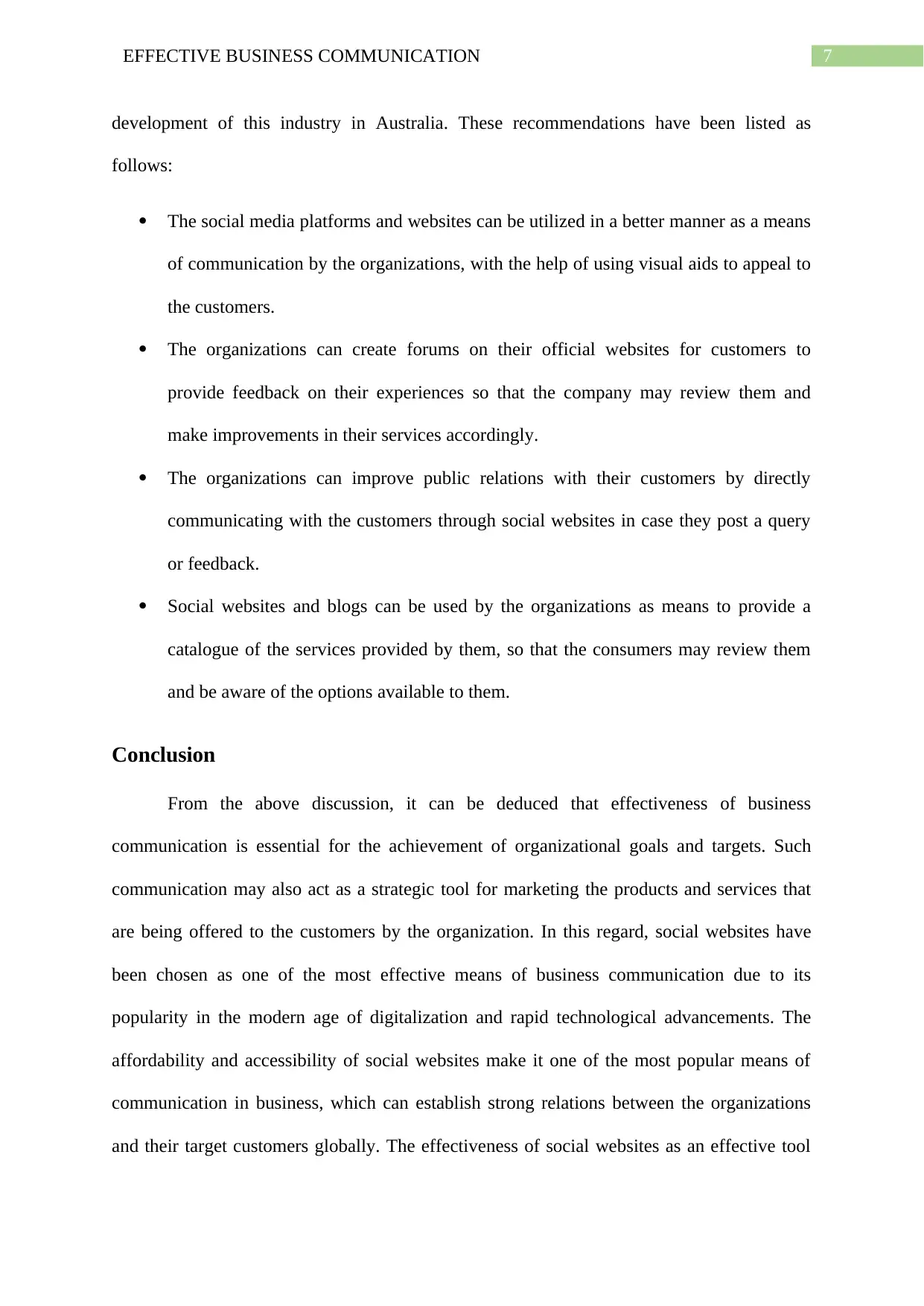
7EFFECTIVE BUSINESS COMMUNICATION
development of this industry in Australia. These recommendations have been listed as
follows:
The social media platforms and websites can be utilized in a better manner as a means
of communication by the organizations, with the help of using visual aids to appeal to
the customers.
The organizations can create forums on their official websites for customers to
provide feedback on their experiences so that the company may review them and
make improvements in their services accordingly.
The organizations can improve public relations with their customers by directly
communicating with the customers through social websites in case they post a query
or feedback.
Social websites and blogs can be used by the organizations as means to provide a
catalogue of the services provided by them, so that the consumers may review them
and be aware of the options available to them.
Conclusion
From the above discussion, it can be deduced that effectiveness of business
communication is essential for the achievement of organizational goals and targets. Such
communication may also act as a strategic tool for marketing the products and services that
are being offered to the customers by the organization. In this regard, social websites have
been chosen as one of the most effective means of business communication due to its
popularity in the modern age of digitalization and rapid technological advancements. The
affordability and accessibility of social websites make it one of the most popular means of
communication in business, which can establish strong relations between the organizations
and their target customers globally. The effectiveness of social websites as an effective tool
development of this industry in Australia. These recommendations have been listed as
follows:
The social media platforms and websites can be utilized in a better manner as a means
of communication by the organizations, with the help of using visual aids to appeal to
the customers.
The organizations can create forums on their official websites for customers to
provide feedback on their experiences so that the company may review them and
make improvements in their services accordingly.
The organizations can improve public relations with their customers by directly
communicating with the customers through social websites in case they post a query
or feedback.
Social websites and blogs can be used by the organizations as means to provide a
catalogue of the services provided by them, so that the consumers may review them
and be aware of the options available to them.
Conclusion
From the above discussion, it can be deduced that effectiveness of business
communication is essential for the achievement of organizational goals and targets. Such
communication may also act as a strategic tool for marketing the products and services that
are being offered to the customers by the organization. In this regard, social websites have
been chosen as one of the most effective means of business communication due to its
popularity in the modern age of digitalization and rapid technological advancements. The
affordability and accessibility of social websites make it one of the most popular means of
communication in business, which can establish strong relations between the organizations
and their target customers globally. The effectiveness of social websites as an effective tool
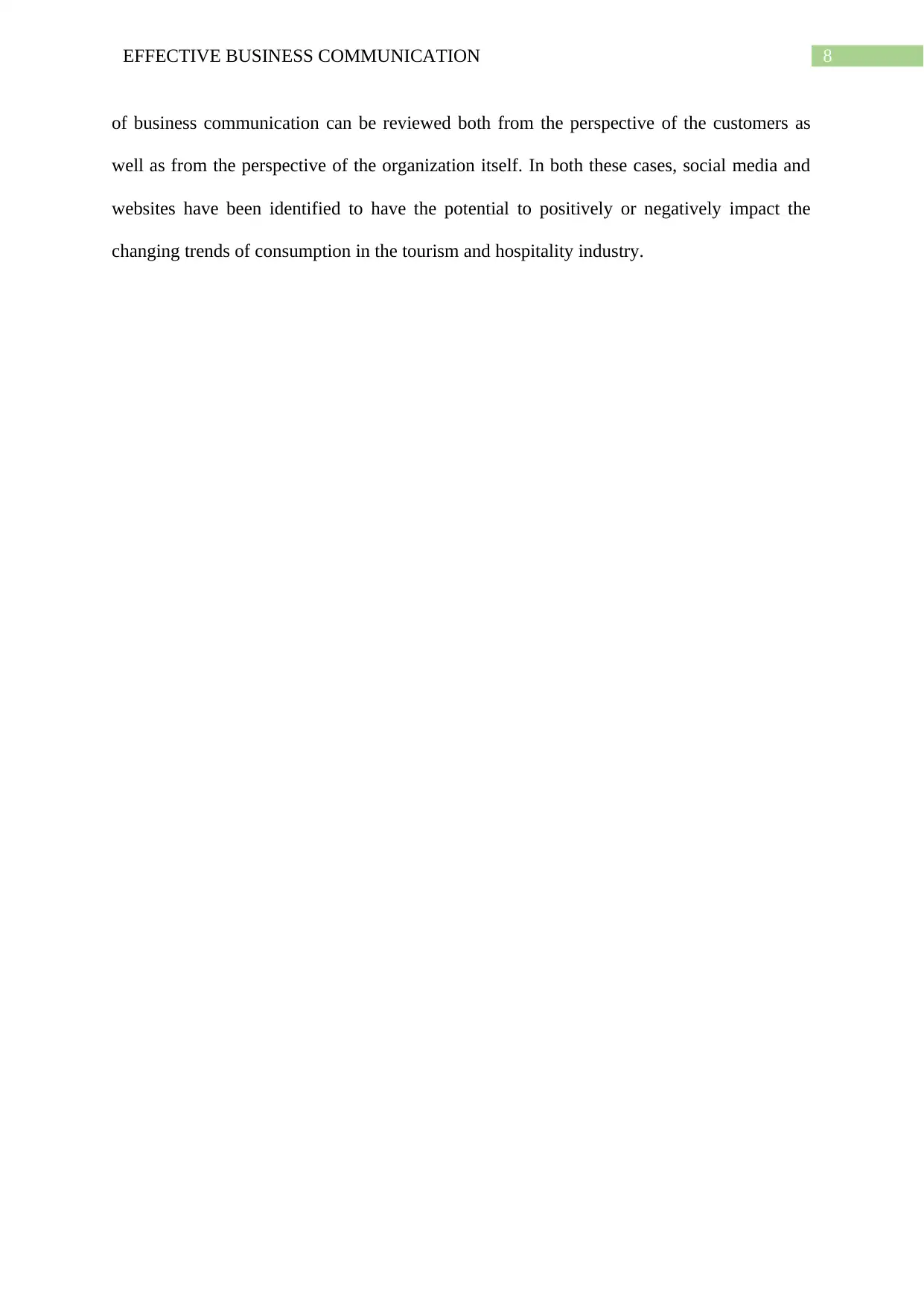
8EFFECTIVE BUSINESS COMMUNICATION
of business communication can be reviewed both from the perspective of the customers as
well as from the perspective of the organization itself. In both these cases, social media and
websites have been identified to have the potential to positively or negatively impact the
changing trends of consumption in the tourism and hospitality industry.
of business communication can be reviewed both from the perspective of the customers as
well as from the perspective of the organization itself. In both these cases, social media and
websites have been identified to have the potential to positively or negatively impact the
changing trends of consumption in the tourism and hospitality industry.
⊘ This is a preview!⊘
Do you want full access?
Subscribe today to unlock all pages.

Trusted by 1+ million students worldwide
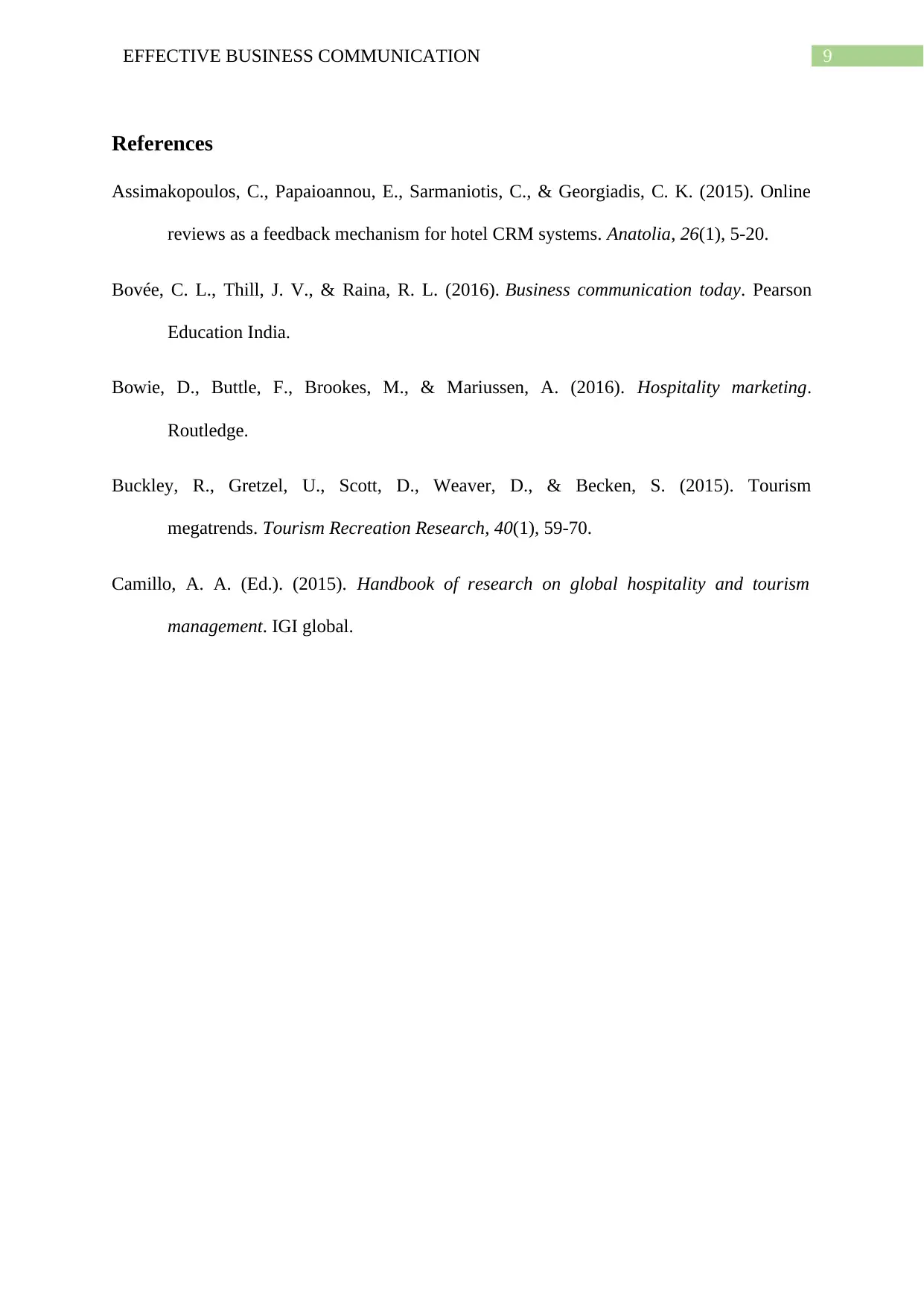
9EFFECTIVE BUSINESS COMMUNICATION
References
Assimakopoulos, C., Papaioannou, E., Sarmaniotis, C., & Georgiadis, C. K. (2015). Online
reviews as a feedback mechanism for hotel CRM systems. Anatolia, 26(1), 5-20.
Bovée, C. L., Thill, J. V., & Raina, R. L. (2016). Business communication today. Pearson
Education India.
Bowie, D., Buttle, F., Brookes, M., & Mariussen, A. (2016). Hospitality marketing.
Routledge.
Buckley, R., Gretzel, U., Scott, D., Weaver, D., & Becken, S. (2015). Tourism
megatrends. Tourism Recreation Research, 40(1), 59-70.
Camillo, A. A. (Ed.). (2015). Handbook of research on global hospitality and tourism
management. IGI global.
References
Assimakopoulos, C., Papaioannou, E., Sarmaniotis, C., & Georgiadis, C. K. (2015). Online
reviews as a feedback mechanism for hotel CRM systems. Anatolia, 26(1), 5-20.
Bovée, C. L., Thill, J. V., & Raina, R. L. (2016). Business communication today. Pearson
Education India.
Bowie, D., Buttle, F., Brookes, M., & Mariussen, A. (2016). Hospitality marketing.
Routledge.
Buckley, R., Gretzel, U., Scott, D., Weaver, D., & Becken, S. (2015). Tourism
megatrends. Tourism Recreation Research, 40(1), 59-70.
Camillo, A. A. (Ed.). (2015). Handbook of research on global hospitality and tourism
management. IGI global.
1 out of 10
Related Documents
Your All-in-One AI-Powered Toolkit for Academic Success.
+13062052269
info@desklib.com
Available 24*7 on WhatsApp / Email
![[object Object]](/_next/static/media/star-bottom.7253800d.svg)
Unlock your academic potential
Copyright © 2020–2026 A2Z Services. All Rights Reserved. Developed and managed by ZUCOL.





